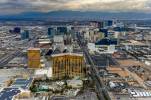Biography details life of man who helped change Las Vegas
EDITOR'S NOTE: This is the first of two excerpts from Jack Sheehan's "Quiet Kingmaker of Las Vegas" about E. Parry Thomas. Sheehan interviewed Thomas as well as casino industry executives for this book about the life of a Las Vegas pioneer.
Quiet Kingmaker of Las Vegas" pulls back the curtain on how E. Parry Thomas helped build modern Las Vegas.
From his arrival in 1954, Thomas believed in Las Vegas. While others scoffed at the desert gambling outpost, Thomas envisioned the resort metropolis it would become. But it probably would not have happened without him. Taking charge of a tiny bank, Thomas built the institution by doing something his competitors would not: He loaned money to casino operators. Thomas' willingness to finance the boys with shady pasts helped transform Las Vegas into an international tourist mecca.
In "Quiet Kingmaker," Thomas, who for decades operated largely out of the spotlight, reveals how he and other Las Vegas pioneers made it all happen. Interviewed extensively by veteran journalist Jack Sheehan, Thomas describes the deals he made to build and expand Strip hotels such as the Sahara, Stardust, Sands and Riviera. He also provides fresh insights into the Howard Hughes years, as he played a key role in the reclusive billionaire's casino and real estate buying spree.
Around the same time, Thomas befriended a young upstart named Steve Wynn and they developed a father-son relationship that has served both men well through the years. With Thomas giving him his start in Las Vegas, Wynn went on to become the creative genius behind The Mirage, Treasure Island, Bellagio and Wynn resorts.
"Quiet Kingmaker" is an oral history, but it's not only Parry Thomas' voice. A Who's Who of Las Vegas movers and shakers is heard from, including casino industry legends Steve and Elaine Wynn, Jack Binion (son of Benny Binion), Bill Boyd (son of Sam Boyd) and Michael Gaughan (son of Jackie Gaughan), as well as newspaper publisher Brian Greenspun (son of Hank Greenspun), Bob Maheu (the late "alter ego" of Howard Hughes), developer Irwin Molasky, financier Michael Milken and family members of Thomas and his longtime business partner, Jerry Mack.
PARRY THOMAS
I'm the guy that got the mob out of Las Vegas, with getting the legislation passed to have corporate gaming and putting in the safeguards such as anybody with over 5 percent interest in the place having to stand for licensing. It didn't say you had to be licensed, just that you had to stand for it and be investigated for it and so on. And the thing that got the Mob out quicker than anything else was passing that law, because before the corporations couldn't come in. If I'm insistent about taking the credit for that, it's because I did it all by myself and it took years of hard work and negotiating with the Legislature to make it happen.
• • •
There are two sides to the issue of the Mob's role in building Las Vegas. In my viewpoint, I don't think they were builders at all.
When I arrived in 1955, the Mob was in full force running every hotel on the Strip. I don't know about downtown. I know they had influence in the El Cortez -- New Jersey did -- but keep in mind the whole situation was under the hierarchy of the Mob, and the important people in the Mob could never get licensed, so they hid behind shields.
Every individual involved in gaming had to be licensed separately and so every place had what they called points. There was a hundred points in each place. The Mob had people get licensed that they would have a piece of. A shield would get licensed and appear to have 10 points and in reality he might have only half a point. All the rest belonged to the Mob.
The whole thing came down to the counting room and cutting up the take in there and siphoning off all the dollars. You could just not build a future under that type of operation because there wasn't that much money to begin with back then. The real owners couldn't identify themselves. They had to hide all the time.
Like Jakey Friedman had 20 points in the Sands and Jack Entratter had 20 points and Carl Cohen had 10 points and so on. Aaron Weisberg had 20 and he probably owned only half of it because he was Meyer Lansky's man. This went on everyplace.
I don't think there's any question that Hank Greenspun knew the intimacy of the hotels as well as, or even better than I did. He started out with Bugsy Siegel, and from there graduated to the Desert Inn with Moe Dalitz and Wilbur Clark and those guys. He was very intimate with them originally, but the fact is they didn't trust him. They actually hated him, Moe Dalitz in particular.
One time Moe pinned me down at his house. It was at a dinner party and he took me into the bedroom and sat me down and said, "I want you to stop loaning money to Hank Greenspun." He said, "We got him on the ropes and we gotta break him. He's attacking us and we can't have him in this town any longer." (Nate Mack had told Parry early in his career in Las Vegas to make certain that Hank Greenspun's newspaper never went out of business, that he was a friend and that he was to be protected at all costs ...)
I just had to stand up to him. I said, "Moe, I never talk about banking business of one individual with another, and I'm not going to talk about yours with him or his with you, and that's where I stand on it."
Moe respected that, and that was the end of it.
Hank might have seen the evolution of Las Vegas all along, but the Mob had absolutely no idea of building big here. It was all about hidden interest. Their whole involvement was predicated on getting involved in gaming and skimming off the top. Period. Their whole interest in the city was getting tax-free money.
Having said that, there's no question that Moe Dalitz was very good for Las Vegas. He was a real cornerstone in advancing all the good causes. When I formed the United Fund, which became the United Way, I went to Moe and explained to him that the community chest was in dire need of social services, and that the gaming business was going to feel some repercussions if the social services weren't taken care of. I remember telling Moe at the time that he and his people were very generous, that they were giving a lot of money for charity, but that it was all going back to Cleveland or wherever they came from, that they weren't giving it in Las Vegas. And it was like a light switch went on.
"You're absolutely right," he said. "We have to do more here."
So he joined with me in the United Fund effort, and we became the two drive chairmen.
Moe was the most effective drive chairman I ever saw. He never asked anybody how much they were going to give; he told them. And it worked out just fine.
• • •
Getting back to Howard Hughes, it was a shame what happened to him as the years went by. The split with Bob Maheu was unfortunate. I like Bob very much and think he did great work for Hughes in Las Vegas, but what happened to him with Hughes and the guys they called the Mormon Mafia was partly brought on by Bob himself. As the months and years went by, and he was the top guy representing Hughes in all these major acquisitions, he started living like Howard Hughes himself should have been living. He had them build a big house for him on the Desert Inn golf course, and he traveled well and lived in style. I believe resentment set in from those others around Hughes.
I could tell from the other fellows that there was an edge there. Bob had a boat he was using and he was flying all around and I think an outright jealousy emerged from the internal structure around Hughes, and I think Bill Gay was involved in it. And Bill was a good friend of mine.
I put Bill Gay on the board of the University of Utah when I was on it, and that was very important because the school became a beneficiary of the Hughes Medical Foundation money for grants.
The only guy I didn't care for was one of the prominent attorneys for Hughes, who I know worked hard behind the scenes to oust Bob Maheu from the Hughes organization. I just had an inherent reaction to be on guard and watch my back and be extra careful what I said around him, and I'm sure that Maheu had the same problem with him.
As I said, I never saw Hughes in person during the '60s. The last time I'd talked with him in person was with Jakey Friedman at the Sands Hotel in the late '50s. There are important people who say they saw Hughes in the '70s, but I would be suspicious of some of those stories. I mean if Maheu never saw him, how could these other people get meetings with him?
In hindsight, the impact of Howard Hughes moving here when he did just was enormous. I think more than anyone else who was here at the time, I realized the depths of the financial depression this city was in just before Hughes came here. We were having real troubles in Las Vegas, corporate influence hadn't yet set in, and we were scrambling at the bank to keep things on an even keel.
There's so much ballyhoo about Hughes and so many different stories. Some of the purchases that were made I didn't agree with. There has been a lot written about Hughes and Kirk Kerkorian, and the competition between them. When Kerkorian announced that he was going to build the International (now the Las Vegas Hilton), I was asked by the Hughes people to study the Landmark, which was across the street. I went through that study from top to bottom and all over, and I wrote about an eight-page yellow-sheet report on it. With Hughes, you wrote only one report and that was it. He got it, you didn't keep any copies, and that was the rule. In that report I told him it was a terrible situation, that the place was built upside down. The casino was located on top of the building then, and that didn't make any sense to me. You could never make it economically there because there weren't enough rooms and you couldn't haul in enough customers or food or anything. You couldn't make a go of a three-shift business there. The floor plan would only afford so many tables, particularly craps tables because of their size.
The owner, who as I recall was connected to the Mob, was asking $8 million for the Landmark at the time and I just absolutely slammed the hell out of it in that report. The next thing I knew, about a half-year later and unknown to me, they sent Maheu or whoever in there and ended paying some god-awful price like $18 million for it. I have to think it was connected to ego, and the fact that Kerkorian was building the International across the street and Hughes wanted to own a taller building than Kirk's. I had absolutely nothing to do with that sale. Sure enough they eventually had to tear the damn thing down. It was impossible economically. It was a helluva good piece of land, though. I wrote in the report that if they could buy the land cheap enough, it had some land value.
There weren't a lot of buyers out there for these Strip properties. Carl Cohen and I had been to Dallas to meet people we thought might buy the Sands, but we found the market was flat.
Then Hughes comes here with all the publicity surrounding that, and the charisma and aura of this man, with all his wealth and fame, just lit a fire under everything. If you took all the wealthy guys in Las Vegas together, the sum total of their wealth wouldn't have equaled that of Howard Hughes at that time. His presence and involvement gave us the Good Housekeeping seal of approval. Las Vegas was no longer just a place for old gambling guys with shaky backgrounds.
As we started buying properties for him -- and I spent over $300 million of his money -- we instantaneously had 80 or 90 millionaires running around town. It was unbelievable how the wealth trickled down. You just couldn't make a bad loan in that kind of atmosphere.
"Quiet Kingmaker" is published by Stephens Press, a division of Stephens Media Group, which owns the Las Vegas Review-Journal. To purchase the book or for more information, go to stephenspress.com or call 383-0496.
Today we begin a two-part series featuring excerpts from the book "Quiet Kingmaker of Las Vegas: E. Parry Thomas" by Jack Sheehan.
The biography details the life of E. Parry Thomas, who took charge of a tiny bank and helped finance many of the casino owners who would in turn change Las Vegas into a major tourist destination.
The story is told through interviews with various players, such as Thomas himself, Steve and Elaine Wynn, Jack Binion (son of Benny Binion), Bill Boyd (son of Sam Boyd), members of the Thomas family, his longtime business partner Jerry Mack and others.
Each section is told in the interviewees' own voices as they recount their experiences with Thomas and his role in the growth of Las Vegas.
Part One, running on the Books Page today, features sections about Thomas' experiences with members of the Mob as well as details of his dealings with Howard Hughes.
Part Two, running next Sunday on the Books Page, will delve into the "father-son" relationship between Thomas and Steve Wynn, including Wynn's own recollections.
Sheehan is a Las Vegas resident and the author of 15 books.
LAS VEGAS REVIEW-JOURNAL


























